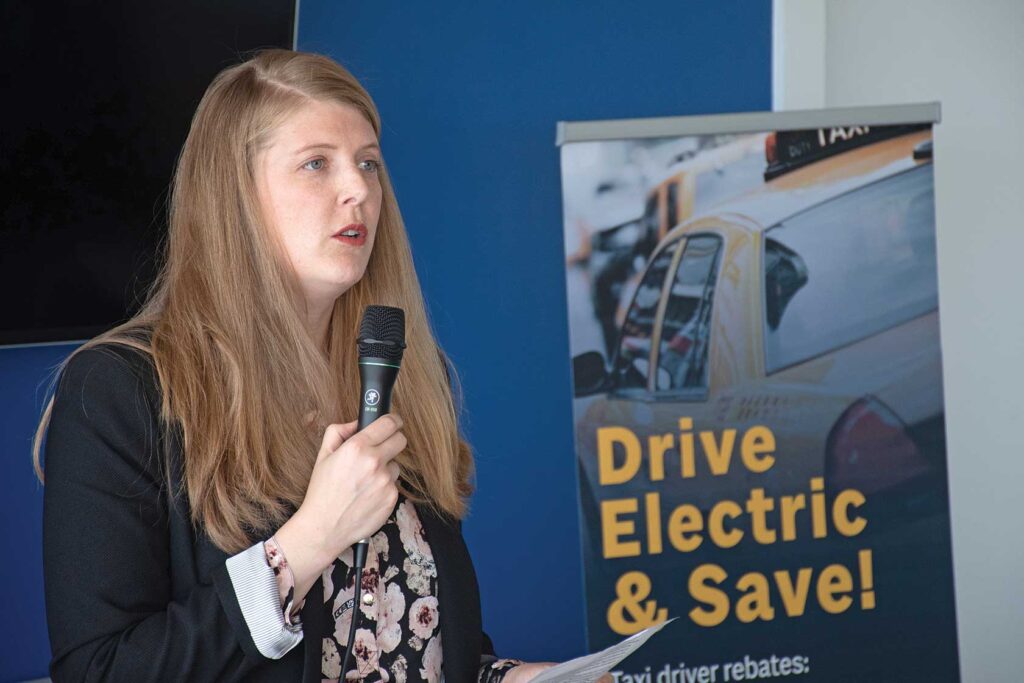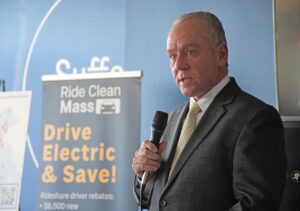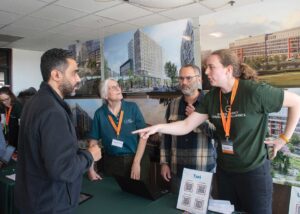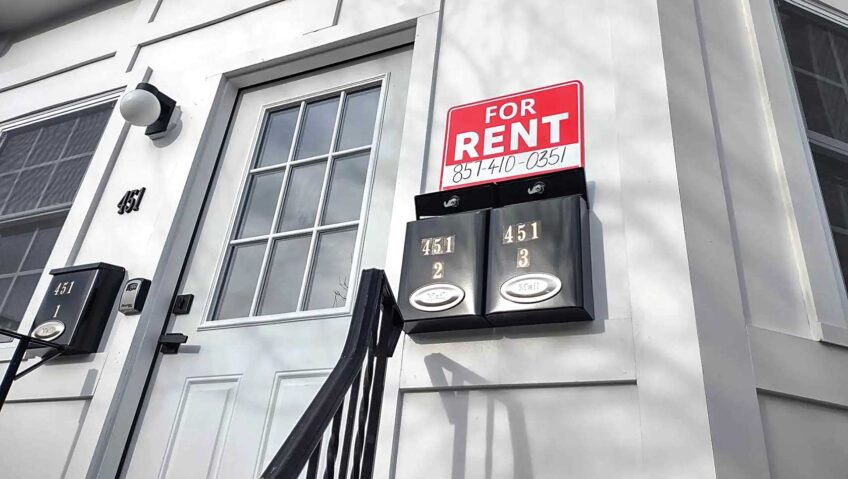State offers new rebates for rideshare, taxi electrification
Drivers can get $2500 - $6500 back on new or used EV models

A new incentive program from the state of Massachusetts aims to connect more taxi and rideshare drivers to electric vehicles.
The program, announced at a November 12 press conference, targets vehicle-for-hire drivers, who see more mileage on the roads.
“What will make this program so effective is that it provides resources to our highest mileage and most public-facing drivers who work hard to help all of us get around safely and conveniently,” said Rep. Jeffrey Roy, who chairs the Massachusetts Joint Committee on Telecommunications, Energy and Utilities, at the press conference.
Under the program, rideshare and taxi drivers will be able to get up to a $6,500 rebate from the state for the purchase of a new electric vehicle and up to $2,500 for a used EV. Drivers who lease an electric vehicle can receive $100 a week for four weeks..
At the event, staff from the Massachusetts Clean Energy Center and CALSTART, the national clean transportation nonprofit that is leading the program in Massachusetts, touted the potential for combined savings, with other state and federal rebates and tax credits—up to $20,000 for Uber and Lyft drivers and $17,500 for taxi drivers.
With the long distances they drive, the program should help improve air quality in the state, said Jason Zimbler, director of light-duty vehicles at CALSTART.
“These drivers log countless miles every day, and by helping them switch to EVs, we’re not only empowering them to save on fuel and maintenance, we’re also taking a giant step toward improving air quality across Massachusetts,” Zimbler said. “It’s truly a win-win.”
And Roy said he thinks the new incentives will help bring the state toward its climate goals for the next few years and decades.

Rep. Jeffrey Roy, chair of the Joint Committee on Telecommunications, Energy and Utilities, promotes the Ride Clean Mass incentive program. PHOTO: AVERY BLEICHFELD/BAY STATE BANNER
“Transportation is the largest single source of greenhouse gas emissions, and it’s responsible for 37% of statewide emissions in 2020. It’s crucial that we continue to incentivize the adoption of electric vehicles if we are to meet 2030 and 2050 climate goals,” he said.
Massachusetts has set targets to get 900,000 electric vehicles on the road by 2030. As of December 2023, there were about 70,700. The state’s climate plan includes an interim target of 200,000 vehicles by 2025.
Also, the state hopes the new incentives will specifically support communities that are less likely to consider electric vehicles or that face greater barriers to access.
“As Massachusetts strives to reduce emissions in the transportation sector, it is imperative that we ensure the focus on priority populations who may have additional barriers to clean energy technology adoption or have higher impacts from the emissions in the sector,” said Rachel Ackerman, senior director of transportation at the MassCEC.
In an effort to make sure information about the incentives spread widely, the Translation Center at the University of Massachusetts Amherst is providing materials for the program in Spanish, Portuguese and Arabic.
The promise of those incentives may be finding their mark.
Tria Hector, a Dorchester resident and full-time Uber driver, said she has been hesitant to consider an electric vehicle but that the rebates and offers have persuaded her to consider the purchase.
Ken Gongo, a Revere resident who also drives for Uber, said he is “definitely thinking” about getting an electric vehicle. He listed the financial incentives through programs like Ride Clean Mass as one of the reasons he thinks now is the time to make the switch.

Staff from the Green Energy Alliance help sign up visitors to test drive electric vehicles at an event promoting new electric vehicle-for-hire rebates, at Suffolk Downs racetrack, Nov. 12. The new incentives, through a program called Ride Clean Mass are part of a state push to increase uptake of electric cars among drivers who are on the road most. PHOTO: AVERY BLEICHFELD/BAY STATE BANNER
For Hector, what also helped was the opportunity to try out an electric vehicle. Following the press conference, rideshare and taxi drivers had the chance to test drive a handful of models of electric vehicles in the parking lot of the former Suffolk Downs hose racing track in East Boston, where the event was held.
Hector test drove two electric Audis and said that the experience helped push her toward the possibility of buying an electric vehicle for use as a rideshare driver.
“Up to this I’ve been strictly gas and wanted to stay gas, but this event did help me,” she said.
Hector said she has concerns about the range of electric vehicles — which tends to be less than their internal combustion engine counterparts, though that is changing as the technology develops — as well as a more limited network of chargers.
“I’m already one of those people who forget to gas up when low, so I don’t want to be stranded somewhere because there’s no charge station nearby,” she said.
But in test-driving the Audis, she learned that the range was longer than she expected, a factor that helped shift her perspective, she said.
Efforts from the city and state are looking to grow the number of electric vehicle chargers, with more to come.
Ackerman said MassCEC recognizes the need for a comprehensive approach to electrifying the transportation sector and is preparing to launch an initiative, also alongside CALSTART, to support vehicle-for-hire charging this winter.
During remarks at the press conference, she said she hopes the new incentives will help foster feedback from vehicle-for-hire drivers about where those resources would be most helpful.
“As taxis, Uber and truck drivers continue to purchase EVs, it is important to have the charging resources to sustain this transition,” she said.






